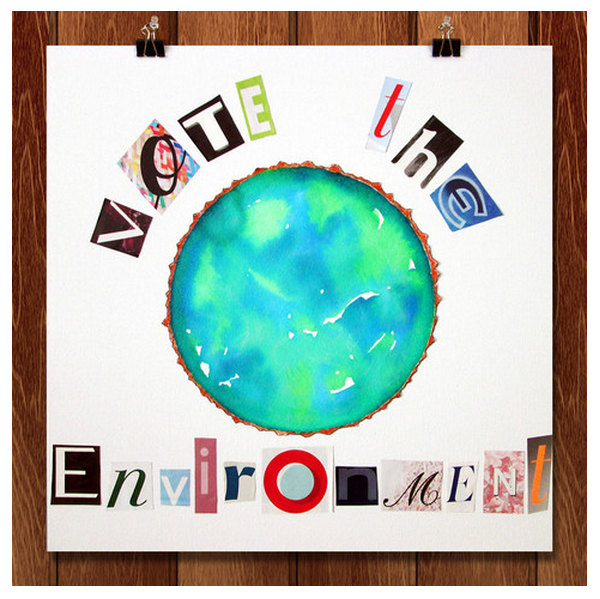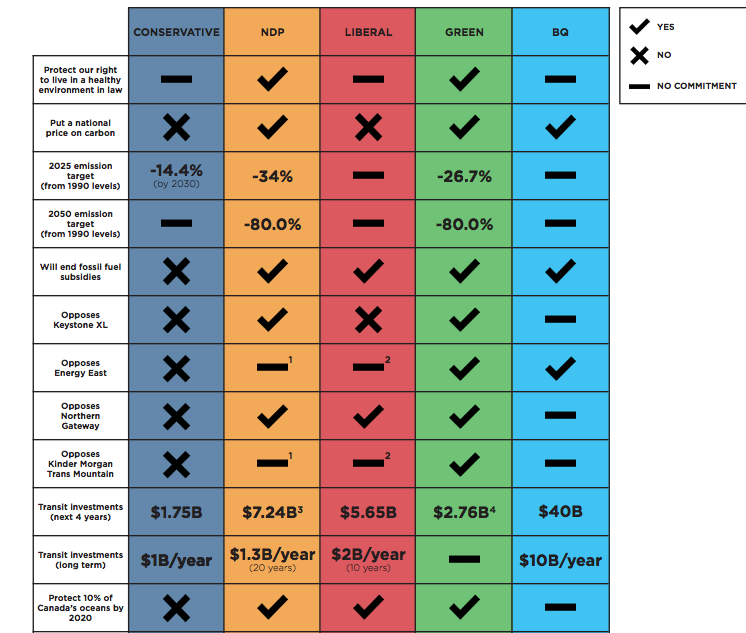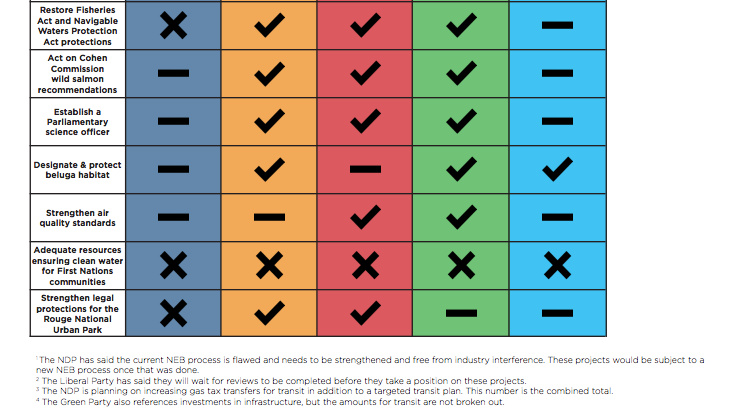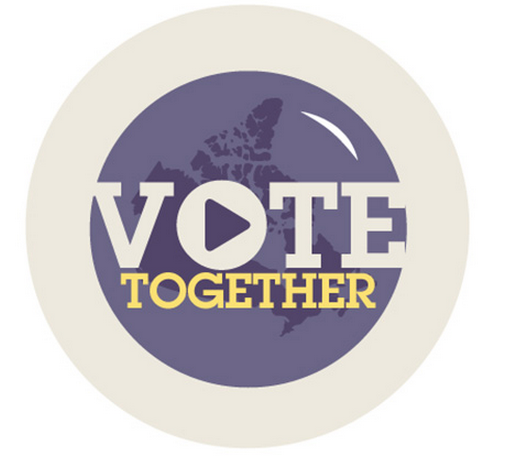Election 2015: Still not sure how you’re going to vote? #VoteEnvironment
October 18, 2015

No matter which way you lean politically, most Canadians care deeply about the environment and are tired of seeing it treated like trash. I’ve talked to conservative greens that are just as fed up with the feds as Green party greens. A strong majority of the country, blue, red, orange or green, wants tougher action on climate change and stronger environmental laws. So which party should you vote for? Should you vote strategically? Vote swap? Stick to your first choice? Go for your favourite green local? I weigh all the various voter strategies in my latest column, The Torn Environmentalist, but there are loads more helpful tools to help you make up your mind so I thought I’d share a couple here. Plus if you scroll down you’ll find a refresher on the Harper government’s environmental record.
The platforms: where do the parties stand on green issues?
Lots of green orgs have put out handy charts to help you but the David Suzuki foundation has the most comprehensive cheat sheet I’ve seen. Check it out:


You might also want to check out York U environmental studies prof Mark Winfield’s blog on the party platforms. He has a more detailed chart on where the parties stand on environmental issues.
All that being said….how should you vote?
Well, that’s up to you. But the environmental insiders, academics and analysts I spoke to said that if you’re in a riding where the conservatives don’t stand a chance, then vote however you like. Be it NDP, Liberal, Green, go with your heart.
Are you in a conservative swing riding? Find out here.
If you are then many of the enviros I spoke to strongly suggested that you consider voting strategically for the party that’s got the best chance of winning. If you do, search out the latest polls to see which local opposition candidate is in the best position to win in your riding. Six in 10 Canadians are in the Anyone but Harper camp. But don’t vote blindly with a wild guess. Check to see if there’s been any local polling done in your riding. Lead Now’s Votetogether.ca posts all the lastest polling info. You can punch in your riding by pressing on this button below and find out more info. Based on local polling, Lead Now has put out a list of 29 recommended candidates, so far 16 Libs and 13 NDPers.
There are, of course, problems with this strategy. There aren’t polls for every swing riding. General calls to vote strategically from different parties can end up cancelling each others votes out. And strategic voters (and pollsters) never could have guessed that the NDP would have swung into power in Quebec. Polls can’t predict everything, as we’ve seen before. But go in as well informed as you can.
Whatever you decide, just get out there and exercise your rights as a citizen and vote. Period.
Canada’s forests, lakes, rivers, wildlife and fellow human beings need you at the polls.
And just in case you need a refresher on the Harper government’s environmental record…
Here’s an abridged list originally printed in Alternatives Journal in a piece called Crimes against Ecology by Laura McDonald:
- The 25-year-old National Roundtable on the Environment and the Economy was shut downin March 2013 because the government didn’t agree with its reports. The NRTEE was prohibited from publishing its final report online and from transferring historical materials to another organization. (They circulated them anyway.)
- After seven out of nine Department of Fisheries and Oceans libraries were closed in 2013, decades of public research documents the government claimed would be digitized were dumped in the garbage, sent straight to landfills or even burned, according to numerous reports from government scientists. Affected institutions inlude the Freshwater Institute library in Winnipeg; the Northwest Atlantic Fisheries Centre in St. John’s, Newfoundland and the St. Andrews Biological Station (SABS) in New Brunswick, where Rachel Carson conducted research for Silent Spring. The destroyed documents included critical baseline data from up to 100 years ago.
- Environment Canada is accused of attempting to halt further investigations after the Commission of Environmental Co-operation, a part of NAFTA, was called to action to find out whether tailings ponds in Alberta are leaking into nearby water sources, thus breaking Canada’s Federal Fisheries Act.
- Restrictive new protocols were implemented at Environment Canada in 2007 and Natural Resources Canada in 2010 requiring scientists to obtain government permission before speaking to the media. Meanwhile, the Department of Fisheries and Oceans has restricted scientists from publishing research prior to screening for “concerns/impacts to DFO policy.”.
- Canada withdrew from the Kyoto Protocol in December 2011, sidestepping an estimated $14-billion in penalties for noncompliance with reducing emissions targets below 1990 levels. A much easier federal target of 17 per cent below 2005 levels by 2020 was announced.
- With omnibus Bill C-38, key portions of the Fisheries Act were repealed in June 2012, endangering habitats and removing triggers for impact assessments. Bill C-38 also replaced the Canadian Environmental Assessment Act with a much weaker version that restricts public participation in assessment hearings, and neutered the Species at Risk Act, including removing time limits on permits.
- In December 2012, environmental oversight was reduced by changes proposed by the pipeline industry to the Navigable Waters Protection Act.
- The 2011-2012 Environment Canada budget was reduced by $222.2-million over the previous year and 1,211 jobs were cut. Among the hardest-hit programs were Climate Change and Clean Air, Weather and Environmental Services, Water Resources and Internal Services, the Action Plan on Clean Water and the Federal Contaminated Sites Action Plan. The Chemicals Management Plan, the Clean Air Agenda and the Air Quality Health Index and the Species at Risk programs were eliminated.
- In April 2012, the Sustainable Water Management Division of Environment Canada ended its work on water-use efficiency and conservation, including the Municipal Water and Wastewater Survey, because of $1.5-million in budget cuts.
- Four national marine conservation areas and 42 national parks lost operational capacity when 638 Parks Canada jobs were declared surplus in April 2012.
- To save $79.3-million, 400 jobs were cut at the DFO in May 2012, affecting research stations, fish hatcheries and libraries. The DFO’s Ocean Contaminants & Marine Toxicology Programwas also cancelled entirely. A year later, the DFO’s budget was reduced by $100-million over three years, replaced by $10-million for local organizations to do fish habitat work
- Other casualties of the 2012 budget included the Centre for Offshore Oil, Gas and Energy Research, whose work on the ecological effects of oil and gas was phased out in spite of its experience helping with the BP oil spill cleanup in 2010. The Smokestacks Emissions Monitoring Team was also dismantled to save $718,000, and the Mersey Biodiversity Centre in Milton, Nova Scotia, was slated for closure by April 1, 2014
- On the 20th anniversary of the UV index in October 2012, Environment Canada’s ozone monitoring department was eliminated by a $13.3-million budget cut. (The first ozone hole over the Arctic was discovered in 2011.
- A report from Canada’s Environment Commissioner found delays in Joint Oil Sands Monitoring (JOSM) program initiatives, no concrete plans for monitoring beyond 2015 and that one of two emissions reduction committees hasn’t met since 2011.
- Canada became the only country to withdraw from the UN anti-drought convention in March 2013.
- In April 2013, legislation proposed by the oil and gas industry amended the list of industrial projects requiring environmental reviews, removing provincially regulated pipelines and tar sands processing facilities.
- A report from Canada’s Environment Commissioner found that the federal government lacks clear guidelines about environmental assessment requirements, stating a concern that “some significant projects may not be assessed.”
- The same report revealed that a draft of emissions regulations for the oil and gas sector promised in 2006 – and crucial to meeting fast-approaching reduction targets – has been ready for a year, but no public consultation has taken place. The bulk of consultation so far has been with industry and one province (three guesses which one…)
- The government announced it would not renew funding for the Canadian Foundation for Climate and Atmospheric Sciences in March 2010 (although the facility stopped receiving money in 2006).
- In April 2010, 86 workers were laid off at the Canada Institute for Scientific and Technical Information, the country’s national science library and leading publisher of scientific information.
- The May 2012 federal budget also cut $2-million in annual funding for the Experimental Lakes Area in Northern Ontario. An interim agreement between the International Institute for Sustainable Development and the provinces of Ontario and Manitoba is keeping the 45-year-old globally renowned freshwater research laboratory open until at least March 2014. But in September 2013, the federal government cancelled the agreement that allowed whole-ecosystem experiments to take place, making the kind of research done at ELA illegal.
- In 2013, the National Research Council was told to focus on science with practical business applications.
- The non-partisan international development research organization North-South Institute announced its closure due to federal funding cuts, another blow to evidence-based policy-making.
- In April 2006, the government suddenly stopped funding the $45-million One-Tonne Challenge program carried out by local groups across Canada.
- Environment Canada backed out on $547,000 in promised funding for the Canadian Environmental Network (RCEN) in October 2011, forcing the network to lay off its entire staff. The RCEN is more than 30 years old and has 600 member organizations.
- In January 2012, the Prime Minister’s office threatened Tides Canada’s charitable status for supporting advocacy group ForestEthics. With an audit of Tides Canada already underway, the government ordered the Canadian Revenue Agency to increase its monitoring of charities’ spending in March 2012.
- In February 2012, Public Safety Canada identified environmentalists as “issue-based domestic terrorists” in its counter-terrorism strategy.
- The Centre of the Universe astronomy interpretive centre and 100-year-old telescope in Saanich, BC, were closed to the public as of fall 2013 due to National Research Council cuts.
- The CBC released a list of seven environmental groups being audited by the CRA: The David Suzuki Foundation, Tides Canada, West Coast Environmental Law, The Pembina Foundation, Environmental Defence, Equiterre and Ecology Action Centre. John Bennett of Sierra Club Canada called it “a war against the sector.” Finance Minister Jim Flaherty has said he’s considering far stricter rules about charities using any funds for anything political (currently 10% of spending can go to non-partisan advocacy efforts). Complaints from pro-oil-sands group Ethical Oil are likely behind at least some of the audits. Ethical Oil is believed to be funded largely by industry groups and was founded by Alykhan Velshi, now director of issues management for Harper.
Note: 10 per cent of those organizations’ budgets combined would be $4.8-million – about the same amount Enbridge spent on just one Northern Gateway campaign in 2012.
For a full detailed report on Canada’s Track Record on Environmental Laws 2011-2015, read on.
Enough said? Now get out there and vote for the environment.


